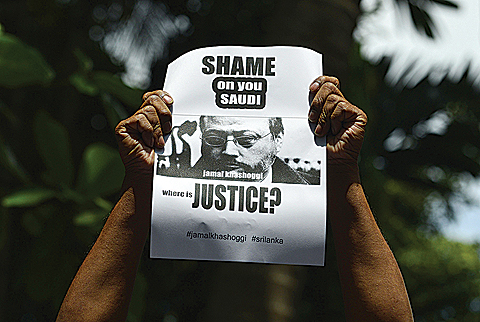Khashoggi's daughters promise to keep his legacy alive
 COLOMBO: A member of the Sri Lankan web journalist association holds a poster with the image of Saudi journalist Jamal Khashoggi during a demonstration outside the Saudi Embassy in Colombo. _ AFP
COLOMBO: A member of the Sri Lankan web journalist association holds a poster with the image of Saudi journalist Jamal Khashoggi during a demonstration outside the Saudi Embassy in Colombo. _ AFPABU DHABI: A senior Saudi prince cast doubt upon the reported CIA finding that Saudi Crown Prince Mohammed bin Salman ordered the killing of journalist Jamal Khashoggi in Istanbul last month, saying the agency could not be counted on to reach a credible conclusion. "The CIA is not necessarily the highest standard of veracity or accuracy in assessing situations. The examples of that are multitude," Prince Turki Al-Faisal, a senior member of the royal family, told journalists in Abu Dhabi on Saturday.
The prince, a former Saudi intelligence chief who has also served as ambassador to the United States, said the agency's conclusion that Iraq possessed chemical weapons before the US invasion in 2003 showed it could be unreliable. "That was the most glaring of inaccurate and wrong assessments, which led to a full-scale war with thousands being killed," he said, speaking at an event hosted by the Beirut Institute think tank. "I don't see why the CIA is not on trial in the United States.
This is my answer to their assessment of who is guilty and who is not and who did what in the consulate in Istanbul."
The CIA has concluded that Prince Mohammed ordered the operation to kill Khashoggi, as first reported by the Washington Post, and briefed other parts of the US government on its findings, sources told Reuters last week. US President Donald Trump has disputed that the agency reached a conclusion on the murder, saying instead "they have feelings certain ways." A Turkish newspaper also reported on Thursday that CIA director Gina Haspel signaled to Turkish officials that the agency had a recording of a call in which the crown prince gave instructions to "silence" the journalist.
Khashoggi was killed at the Saudi consulate in Istanbul on Oct 2 in an operation that Turkish authorities have said was ordered by the highest level of Saudi leadership, prompting the kingdom's biggest political crisis in a generation. After offering numerous contradictory explanations, Riyadh said Khashoggi was killed and his body dismembered after negotiations to persuade him to return to Saudi Arabia failed. The kingdom's public prosecutor is seeking the death penalty for five suspects charged in the murder, but has said Prince Mohammed had no prior knowledge of the operation.
Khashoggi's daughters
In a poignant farewell to their father published in The Washington Post, the daughters of slain Saudi journalist Jamal Khashoggi vowed that "his light would never fade" and that his legacy lived through them. Khashoggi, former Saudi royal insider who became a critic of Crown Prince Mohammed bin Salman, was murdered at the Saudi Arabian consulate in Istanbul last month. His death unleashed a global wave of criticism against the crown prince, who Saudi officials say had no role in the killing. "This is no eulogy, for that would confer a state of closure," Noha Khashoggi and Razan Jamal Khashoggi wrote in a Post opinion piece published online Friday. "Rather, this is a promise that his light will never fade, that his legacy will be preserved within us."
The 59 year-old journalist was at the consulate in Istanbul seeking documents needed to marry his Turkish fiancee. Riyadh-after weeks of denial-said he was killed in a "rogue" operation. The daughters remember their father, affectionately referred to as "Baba," as a "loving man with a big heart" who traveled widely and always returned bearing "gifts and fascinating stories." "As bittersweet as it was, we knew from a young age ... that he was an important man whose words had an effect on people over a great distance."
It was vital for him "to speak up, to share his opinions, to have candid discussions," the daughters recall. For him "writing was not just a job; it was a compulsion. It was ingrained into the core of his identity, and it truly kept him alive. "Now, his words keep his spirit with us, and we are grateful for that." Khashoggi had created a new life in the United States, but "he grieved" for his native Saudi Arabia, never abandoning hope for his country. "Dad was no dissident," the daughters wrote. "If being a writer was ingrained in his identity, being a Saudi was part of that same grain."- Agencies










